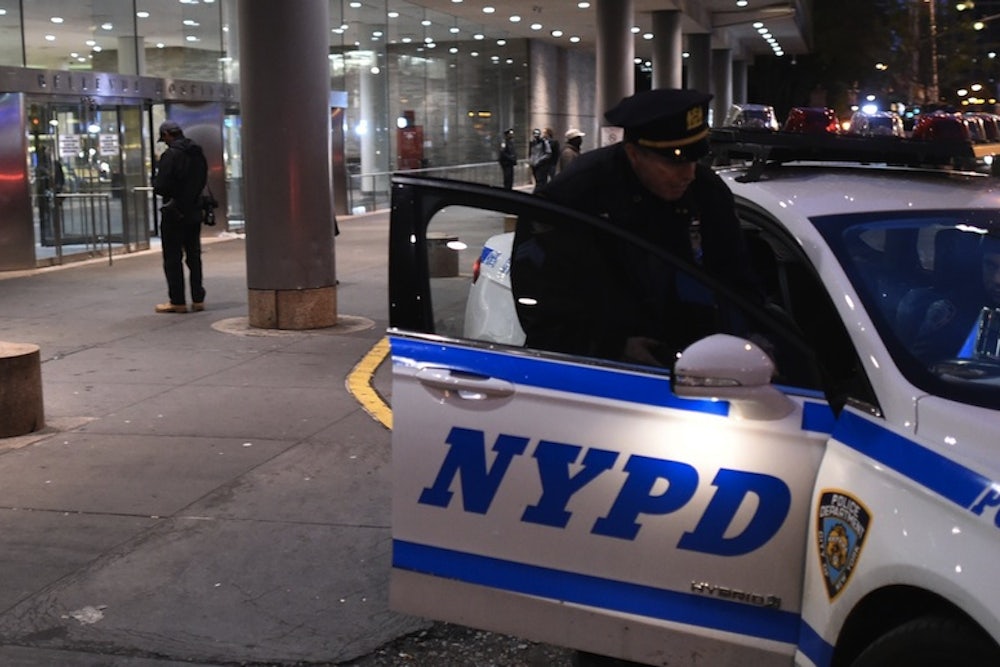Ebola is back. And it’s in New York City.
Craig Spencer, a 33-year-old physician who returned from Guinea on October 19, has tested positive for the disease. He’s now in a special isolation ward at Bellevue Hospital, under the care of hospital staff and advisors from local, state, and federal health agencies.
Spencer, who works with Doctors Without Borders, had been in West Africa to care for Ebola patients. Since coming through the enhanced screening at JFK Airport, he’d been “self-monitoring”—that is, taking his temperature twice a day. He also kept mostly to himself, in his apartment. But he didn’t fully quarantine himself (perhaps for reasons that Howard Markel identifies an essay about physicians). Spencer spent time with his fiancée and two friends. And on Wednesday, despite feeling a little sluggish, he went bowling in Brooklyn, using the subway to get there and an Uber car to get back. The next day he started running a fever—of 100.3 degrees.**
Those details, as much as the diagnosis itself, were getting tons of attention on Thursday night. This morning, New Yorkers are busy retracing their steps, wondering if they were on the number one, the A, or the L—the three subway lines Spencer apparently took. That’s understandable. Ebola is a scary, frequently lethal disease.
But you can only get it one way—by coming into contact with bodily fluids from somebody who is showing symptoms like fever, vomiting, or diarrhea. New York City officials said that Spencer did not have such symptoms when he was out and about on Wednesday. That's why the public health experts I consulted on Thursday were convinced that his travels posed little, if any, danger to the broader public. “Minimal to no risk” is the phrase one used.
You can click here if you want to see their comments in full—or to learn about the government response that’s underway. Already it looks and feels a lot different than what took place a few weeks ago, when the first American diagnosis took place in Dallas, Texas, and neither the hospital nor public health officials seemed quite certain what to do. The lack of preparation helps explain why two nurses who cared for the Ebola patient there later contracted the disease. Thankfully, one is now free of the virus and the other’s condition is improving.
Exposure could still happen at Bellevue, of course. The tragic horror of Ebola is that the people most at risk of getting the disease are those caring for the sick. That's likely how Spencer got it, after all, and as a worker with Doctors Without Borders he presumably knew what he was doing. But what was true yesterday is true today. Experts expect isolated cases of Ebola to show up here and there, but they don’t expect outbreaks, because the U.S. has the resources and infrastructure to contain the spread and treat those who get it.
The same is not true in West Africa, alas. Thousands of people there have already gotten the disease, many thousands more are likely to get it, and large numbers of them are going to die. Want to be scared about something? Be scared about that.
—Jonathan Cohn
** Original reports suggested that Spencer's temperature was 103 degrees, not 100.3. That's a big difference.
News from yesterday
CLIMATE: European Union leaders reached a deal to cut greenhouse gas emissions at least 40 percent below 1990 levels by 2030, even after strong opposition from coal-rich Poland. (Associated Press) There was also news out of China: Draft rules for its 2016 carbon cap-and-trade market propose hefty fines for governments that don’t comply (Reuters)
CHIEF FEARMONGERER: A few weeks ago, Rep. Duncan Hunter claimed that border patrol had caught 10 Islamic State militants crossing the U.S. border. Danny Vinik factchecked that. Now, he's admitted he's wrong—and says they were al Qaeda militants. Also wrong. (Steve Benen, MSNBC)
AN EBOLA VACCINE?: A decade ago, researchers developed a vaccine that was almost 100 percent effective against Ebola in monkeys, but it never went through clinical trials on humans. Now, the researchers are scrambling to complete the trials as fast as possible. (Denise Grady, New York Times)
Articles worth reading
A grim future: Matt O'Brien explains plainly an important, new paper on secular stagnation, the phenomenon where the interest rates needed to reach full employment are too low. (Wonkblog)
Egg-freezing: Rebecca Traister finds what the media got wrong in response to Apple’s announcement that it would, like Facebook, cover elective egg freezing in its benefits package. (TNR)
Online harassment is everywhere: Some 40 percent of internet users have experienced harassment, and for women age 18-24, roughly a quarter have been stalked and sexually harassed. Jessica Goldstein walks through a Pew survey that quantifies an invisible trend. (ThinkProgress)
Robots are coming: Could a higher minimum wage cause businesses to automate faster? That's unclear. But if does happen, it's hard to imagine the cost-advantages in fast-food restaurants or a grocery store. But in sit-down restaurants, it could be a different story. (Adam Ozimek, Forbes)
Stories we’re watching
Ebola in New York City and West Africa, of course.
At QED
Danny Vinik dives into Elizabeth Warren's foreign policy positions and finds not much there. But if she doesn't run for president, he says, that's not a problem. Here's why America’s organ transplant law is criminally unfair to donors. At the New Republic, Hillary Kelly says the award for dumbest tweet about Ebola goes to … someone very close to Ted Cruz.
Links compiled by Claire Groden and Naomi Shavin.
